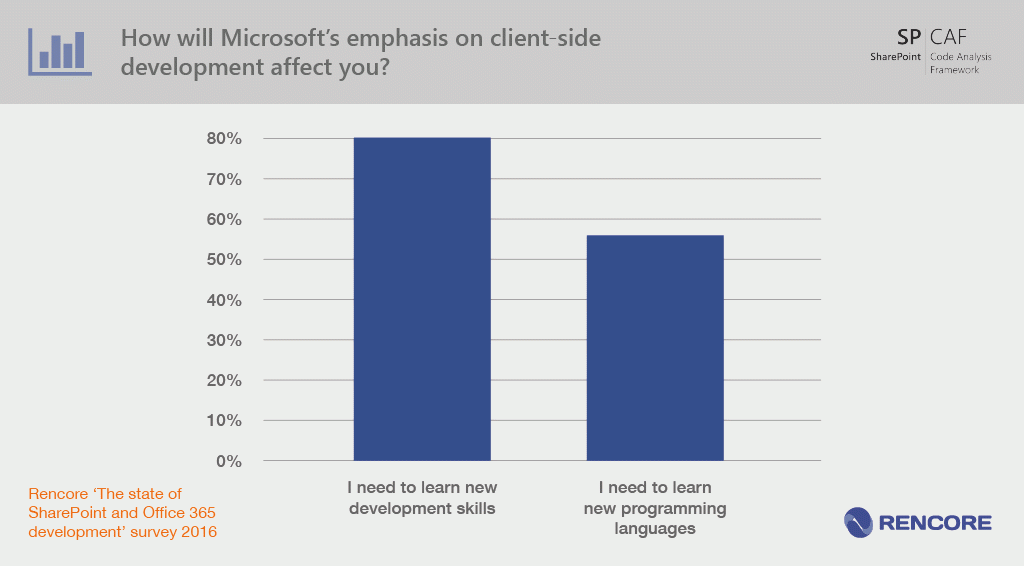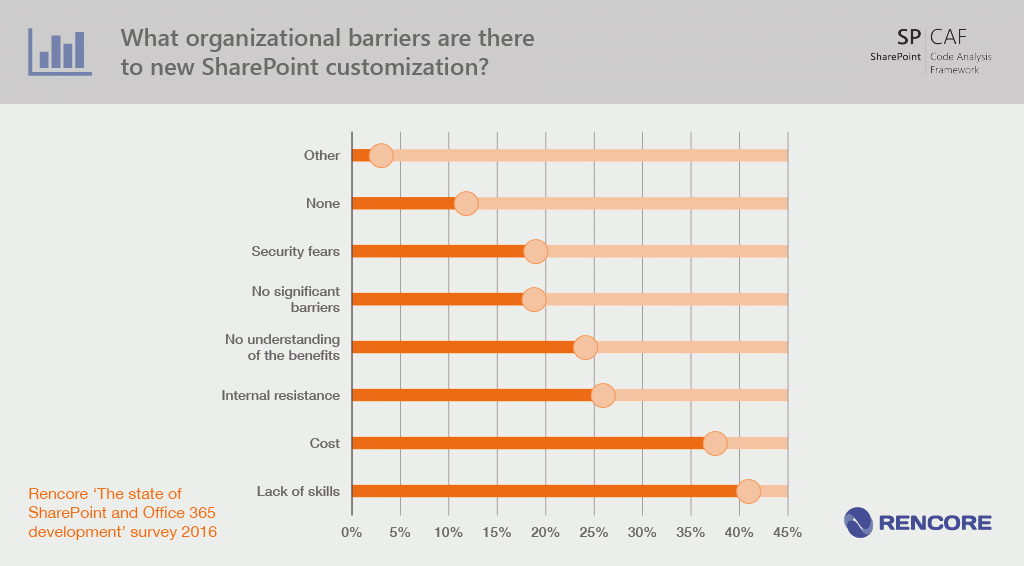At the beginning of this year, Deloitte released the results of their annual global CIO survey, carried out in the tail end of 2015. Among the most important findings was that CIOs continued to complain of a lack of appropriate skills among IT developers and architects. This lack of skills was an obstacle to their wider technology strategy and IT decision makers said they were very keen to fill this gap.
At Rencore, we hear almost every day from IT developers and architects regarding their struggles maintaining skill sets and keeping their knowledge up to date and relevant. The tools and technologies IT professionals are being asked to work with are undergoing almost constant change, and there is a relentless pressure to follow these trends or risk seeing their skills become obsolete.
This autumn, we surveyed over 1,200 SharePoint and Office 365 developers, architects, managers and other IT professionals about how they are working with these platforms as part of our annual community survey. Among the key topics we covered was a discussion of their perceptions about training, skills and knowledge. While most decision makers are aware of the need for more training, our results highlighted that so far, this awareness hasn’t really transformed into action. You can access a full break down of the results by downloading the survey. However, we summarize the key findings that you need to be aware of below.
The pace of technology change is relentless
We gathered opinions and experiences from over 1,200 respondents to find out about how their organizations were adapting to new technologies such as the cloud, hybrid and new development technologies and trends. Our results showed that there is a lot of change within organizations with regards to the technologies they use:
 As this chart shows, almost 70% of organizations are planning to upgrade their primary document storage and product environment in the coming year. Tellingly, there is also a lot of diversity within the kinds of environments different organizations are planning to upgrade to – and all of these will require quite distinct skill sets. This immediately suggests that new skills will be required within companies.
As this chart shows, almost 70% of organizations are planning to upgrade their primary document storage and product environment in the coming year. Tellingly, there is also a lot of diversity within the kinds of environments different organizations are planning to upgrade to – and all of these will require quite distinct skill sets. This immediately suggests that new skills will be required within companies.
One recurring theme we came across was a strong awareness among IT developers and professionals that they would need to upgrade their skills in the coming years. This was largely down to the fact that Microsoft is encouraging developers to change how they work—moving from traditional client side development in C# and .NET to open source and JavaScript frameworks. We asked developers how they see this affecting them.
IT developers and professionals were clear that they would need to enhance their existing skills if they hope to remain in gainful employment. So, if they’re aware of this, what are they doing to boost their current skill sets?
[bctt tweet=”.@rencoreab survey 2016: 90% of IT developers read blogs and articles to enhance their skills”]
As the chart shows, IT developers and architects are turning to a wide range of sources for new training and knowledge, in particular their own self-led training online. What is perhaps most surprising about the results is that only around a third of professionals were receiving training provided by their employer. We explored this in more detail with our respondents:
Strikingly, SharePoint professionals reported receiving only occasional training – the majority received it only a couple of times per year. While it’s true that two fifths of respondents receive training at least once every three months, that leaves a majority who get training much less regularly. This should ring alarm bells for CIOs and other IT decision makers. As the Deloitte survey mentioned earlier outlines, CIOs know that their teams need more training. However, this awareness definitely hasn’t yet turned into concrete action in a high number of organizations. This must change if you plan to help your employees to keep their skills up to date and support you long term.
If there was any doubt about the damage that can arise from not providing training, the following chart should make for sober reading:
As the chart shows, by far the most common reason that organizations cannot complete the customizations they want is due to a lack of skills, with 41%. As outlined above, Microsoft is asking developers and architects to begin developing in new ways; this will demand new skills from them. CIOs must source skilled developers to help with specific customizations but, long term, it will be more economic and prudent to retrain existing employees.
[bctt tweet=”.@rencoreab survey 2016: 41% of organizations cannot complete their customizations due to a lack of skills”]
The ball is in decision makers’ courts
Businesses are setting aside more budget for IT than ever before and there is no longer any doubt that organizations of all shapes and sizes are aware of the importance of IT investment. However, while it might be tempting to spend on exciting new tools, or seem wiser to invest in upgrading legacy systems, we believe there will be huge value in spending more of this budget on training and improving the skills of existing employees.
To learn more about the survey and to explore its results in detail, download your complimentary copy of the report here and begin planning your response to the IT skills deficit.






